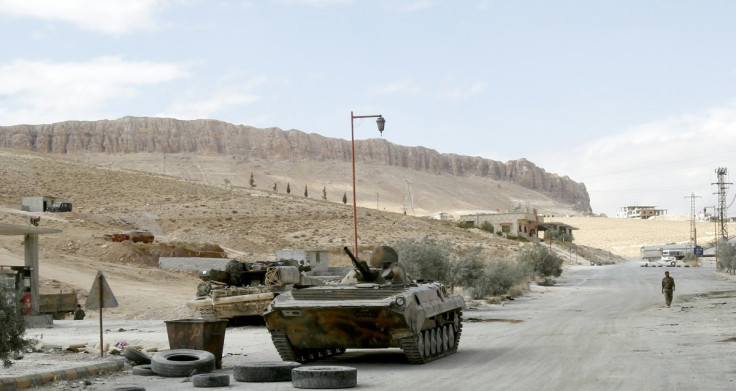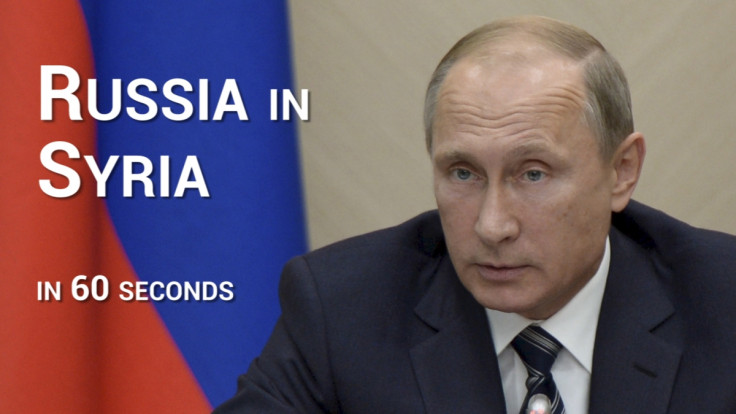Syria: Vladimir Putin is really on the defensive with Russian air strikes

With Russian planes now added to the list of foreign air forces operating in the skies of war-ravaged Syria, this already muddled civil war just got messier. While the US strategy has been one of caution and restraint – some would say hesitant and miscalculated – the Russian intervention seems decisive to a point that could change the course of the long-stalemated conflict.
In the past two days, by targeting various non-Isis rebel groups, including some backed by the US, Russia has sent the message that it will act forcefully to save the Assad regime, regardless of who backs who, and despite its own rhetoric depicting the operation as geared toward Islamic State (Isis).
Assad cannot win back Syria, but Russia will make sure he doesn't lose it all
After four years of fighting, the remaining pillars preserving the Assad regime are showing signs of cracking. The relatively rapid advance of Jaysh al-Fatah –a coalition of anti-regime forces including the al-Qaeda-linked Jabhat al-Nusra – crushed the Syrian army and its allies in Idlib province.
Several weeks before the Russian intervention, rebels took the last Syrian airbase in the province. This prompted concerns that, after clearing remaining pockets of resistance, rebels would turn their attention toward more critical regime stronghold of Hama, or more importantly, the Syrian coast – where Russia's last naval base in the Mediterranean just happens to be.
It shouldn't come as a surprise that Russia invests so much in securing its very limited naval assets. What started as a limited intervention in Ukraine's Crimea, Russia has consistently rolled the dice to save its maritime access.
This also means that despite the apparent boldness of the move, Russia is here on the defence rather than the attack. Russian intervention draws on the lessons of Assad's failure, as the rebel offensive in northern Syria gave the final blow to the strategy adopted by the Syrian president since the civil broke out, meant to ensure at least a minimal presence of regime forces in every Syrian province.
As this strategy draws to its end, Russia will concentrate on saving what little is left of the regime. Assad cannot win back Syria but Russia will make sure he doesn't lose it all. The first strategic objective of the Russian operation will likely be to secure of what many are now calling the "Alawistan", where the Alawite minority is mostly based. Worse come to worse, Syria may officially cease to exist as single entity, but at least Russia will have preserved its foothold in the Mediterranean.
Securing the Alawistan
In the coming weeks, the Russian air force will continue to concentrate its air strikes in Latakia, Hama and the western Homs Province to soften forces threatening key regime areas. The presence of anti-regime forces along vital roads between regime strongholds in the north and the Syrian capital will also encourage further attacks north of Homs, as was the case during the past few days, as well as near Damascus, where rebels recently threatened and the M5 highway between the capital and the northern part of Assad-held Syria.
With reports already signalling a planned ground offensive involving Iran and Lebanon's Hezbollah, the regime may be able to reclaim its faltering grip on Syria's most populated area in the country's north west. This strategy has little place for significant attacks against IS, apart from local strikes against IS positions in Palmyra and near Aleppo, both as a PR stunt and to prevent two critical regime airbases from falling into the hands of the jihadist group.

'Coup de grace' for the US's hesitant strategy in Syria
In Putin's mind, once Russia is done with this first step, Assad's future will be a fait accompli. Russia may launch new diplomatic offensives but it will have made clear that Assad's departure is not on the table. On the other hand, the Russian discourse depicting the whole opposition as an homogenous terrorist faction, may well turn out to be a self-fulfilling prophecy. The opposition, including groups vetted by the US as "moderates, will be even more drawn to join al-Qaeda's Syrian branch.
Two jihadist groups from former Soviet Republic already joined al-Qaeda last week, following Russian intervention. This is concerning, but in no matter is it new: US-trained/equipped rebels did not wait for Russia to step into the game to join either IS or al-Qaeda. Yet on a diplomatic level, this is indeed the "coup de grace" for whatever was US's strategy in Syria.
What could possibly go wrong?
More concerning is the possibility that IS will in fact take advantage of the Russian offensive against Jaysh al-Fatah to launch its own campaign against the groups and the myriad other rebels in north-western Syria. IS is already engaged in a not-so-successful offensive at the border with Turkey, and the Russian offensive gives it an incentive to prioritise this area. This scenario fits into IS's opportunistic strategy in Syria, as the group tends to claim whatever is left from other warring sides.
During the past few months, the group has also been keen to launch offensives against both regime and anti-regime forces to reach Syria's most densely populated areas where air strikes will be less efficient and more complex. Russia's rhetoric for Syrian intervention might very well materialise, with IS effectively reaching areas that are critical for the regime.
Russian intervention may indeed be a bonanza for the group that professed that an alliance of "infidels" would wage the ultimate battle in Syria. In more prosaic words, what may have started as a triumphant Reagan moment for Putin ("Russia is back!"), may also well be the beginning of a long and painful conflict with no clear exit strategy.
Michael Horowitz is a security analyst and head of business development for the Levantine Group.
© Copyright IBTimes 2024. All rights reserved.






